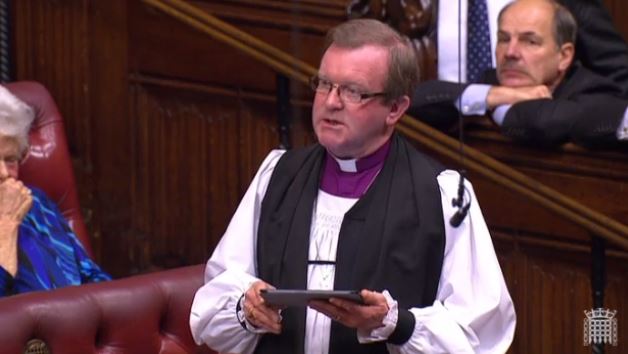On the 11 February 2016 the Bishop of Portsmouth, the Rt Revd Christopher Foster, spoke during the second reading debate on the Government’s Armed Forces Bill. He highlighted the work of the Church of England to support the military covenant, the need to support service families and the significant work of military chaplains.
 The Lord Bishop of Portsmouth: My Lords, by happy coincidence, this debate takes place almost exactly on the anniversary of the signing of the Armed Forces corporate covenant by the right reverend Primates the Archbishops of Canterbury and York. There has been excellent work with the Minister in developing the impact of that covenant, and it is a pleasure to mark that anniversary today and anticipate the maiden speeches this afternoon.
The Lord Bishop of Portsmouth: My Lords, by happy coincidence, this debate takes place almost exactly on the anniversary of the signing of the Armed Forces corporate covenant by the right reverend Primates the Archbishops of Canterbury and York. There has been excellent work with the Minister in developing the impact of that covenant, and it is a pleasure to mark that anniversary today and anticipate the maiden speeches this afternoon.
This Bill properly clarifies the obligations and responsibilities of those serving in the Armed Forces and strengthens provision for maintaining good order and handling any instances of indiscipline with proper regard for justice. These provisions and the contributions that we have heard already remind us, although they are often technical, that individuals in our Armed Forces serve, and occasionally offend, in situations of stress and danger.The House will not be surprised therefore if I briefly draw attention to the importance—and I hope the Minister in summing up can confirm this—that we should all give to the areas of pastoral and family support for those who volunteer to serve us and the nation in this way in the Armed Forces, even when their behaviour falls below highest standards.
My concern relates to the ministry of chaplains in the Army, Air Force and Navy. Many of you will be aware of the pressures on these pastoral and support ministries, which are valued by service men and women because they are offered, and offered to all, regardless of faith or none, outside the chain of command, including and when under charge. This is a high-value/low-cost provision, and it is not always clear, to me at least, that the Treasury as well as the Ministry of Defence understands that. Rumours about a likely fall in chaplaincy numbers, about a new pay scale, which I imagine means a lower pay scale, and the potential de-enriching of the senior post holders, are worrying for the range and effectiveness of the ministry offered to all service men and women, a ministry that is so highly valued. What is rumoured and feared has implications; reduced numbers mean thinner provision; reduced pay risks problems of recruitment and retention; and reduced seniority suggests lower importance for chaplaincy.
Discipline is better enhanced and implemented when there is high morale and access to excellent pastoral support. I trust that in supporting this Bill we can be clear that the wider circumstances, the morale and the support of those who serve us is important alongside the proper legal process.
Earl Howe: [extract] …The right reverend Prelate the Bishop of Portsmouth, my noble friends Lady Hodgson and Lady Scott, and the noble Lords, Lord Ramsbotham and Lord Judd, all referred to the importance of service families. The families of our Armed Forces personnel play a vital role in enabling them to do the job that they do, for which the Government are extremely grateful. We have already taken a number of important steps to that end, but, following feedback, we have started to develop a new UK Armed Forces family strategy to review and improve the support we provide to families. That will be launched by the end of 2016. I could say a huge amount on the topics covered by my noble friend Lady Hodgson, especially on housing and veterans’ mental health, but the key question she posed, which I will briefly address, is how well we think the covenant is working.
….. I also hope to follow up the important comments made by the right reverend Prelate the Bishop of Portsmouth on service chaplains. The same applies to my noble friend Lord Lyell in answer to his questions about Gibraltar and the British Overseas Territories.
This is a good Bill. It is small but it does what it needs to do. I am greatly encouraged by the welcome that noble Lords have given it today and I look forward to Committee and the exchanges that that will undoubtedly bring. I beg to move.
Bill read a second time and committed to a Grand Committee.
(Via Parliament.uk)

You must be logged in to post a comment.